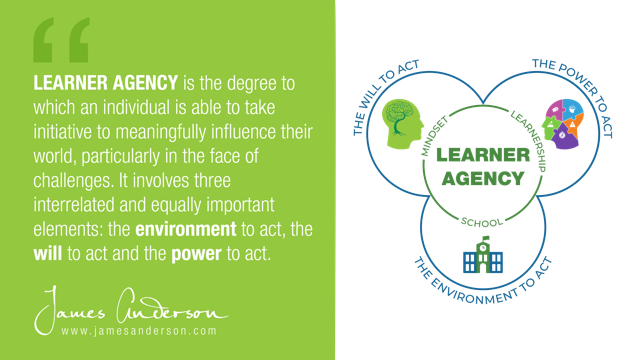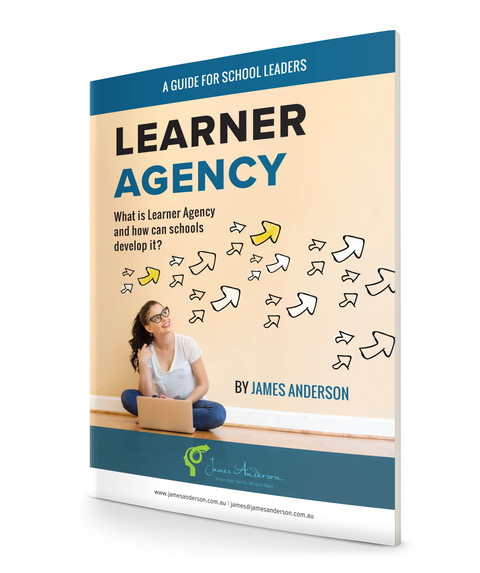Teachers make a difference. But students make a BIGGER difference
Teachers are the single most powerful influence on student achievement.
But that begs the question – are we? Are we really the most powerful influence on student achievement? What about the students themselves? What role do they play in the learning process? And how does that impact student achievement?
Teachers make a difference. Students make a BIGGER difference
Hattie believes that the greatest source of variance that can make a difference to student achievement is the teacher. And it’s his belief that we should improve the quality of teaching to “improve the trajectory of all students”. This line of thinking has been widely accepted in education, and has led to a huge growth in teacher development.
Hattie identifies...
The Struggling Student: Why Do Some Students Simply Give Up?
So what’s the difference? Why is it that some students simply give up (and apparently so easily), while others persist even when it requires hard work and effort? And more importantly, what do we do about it?
Why Do Some Students Simply Give Up?
When we’re faced with these students, it’s easy to draw conclusions. It’s a simple solution to believe that they’re just lazy (and human nature to draw that quick conclusion). But actually that’s probably not the case.
In fact, BOTH students are likely acting...
How to Beat Teacher Burnout
This is important advice because as teachers we work hard. We push ourselves. We care and we fret. We’re constantly learning and striving to give the students in our care the best educational experience. But all this can lead to burnout. And when teachers are burned out, the children suffer as well.

We’ve Been Focused on the Teachers
In recent years our industry has been increasingly focused on what teachers do in the classroom. We’ve created the Australian Professional Standards for Teachers framework. John Hattie—professor of education and the director of the Melbourne Education Research Institute at the University of Melbourne—has had his work translated into High Impact Teaching Strategies for teachers. And educational researchers like Bob Marzarno...
Habits of Mind – Focusing on the “How” of Learning
I’m not talking about being stuck on a particular problem. I’m talking about students being stuck in their learning. These students “try hard” but constantly struggle, finding it difficult to grow and reach new standards each year.
Often, these students slowly fall further and further behind.
These are also the students who take up more of a teacher’s time. At first, we need to scaffold their learning. Then, we need to give them extra support and “hold their hand” as we guide their learning. Eventually, it may seem as though we’re dragging them through the entire learning process – spending more and more of our energy helping them as they achieve less and less.
As a result, teachers feel exhausted.
At some point, these students may simply give up. Having struggled and failed for so long, they stop trying. There is a learnt sense of helplessness. Rather than face the struggle and...
Challenges – Do your students have a good relationship with Challenges?
Do your students look for the easy options, seeking the “path of least resistance”?
Do too many of your students focus on completing work rather than completing it well? Do they ask, “Is this good enough?” Or, “Is this going to count”?
Perhaps your students are inclined to give up as soon as they begin to struggle, even just a little.
Do your students sometimes stre-e-e-e-e-e-tch the time they spend on tasks to avoid attempting the hard problems at the end of the lesson?
If this sounds familiar, then your students don’t have a good relationship with challenges. They look for the instant gratification of doing something easy instead of the long-term gain of doing something difficult.
Students with a poor relationship with challenges need to be led, and sometimes dragged, through the learning process. They need...
Learnership – Are your students skilful learners?
These students weren’t exactly wasting their time, but they weren’t spending their time effectively, either. They’d rarely slack off enough to warrant getting into trouble, but neither would they push themselves enough to excel. They’d be “on task”, but sometimes only barely.
"These students coasted through school, never taking charge of their learning or path through life."
These students handed in work that was “satisfactory”. I’d give them formative feedback on how to improve, but they’d shrug their shoulders and say their work was “good enough”.
From time to time, I’d challenge them to push themselves. I’d write things in their reports like, “Johnny could do...
Learnership - The Skill of Learning
If you’re taking the time to read my blog, then you’re already committed to your professional growth.
You regularly reflect on your practice. You ask yourself, “What’s working? What’s not? How might I improve?”
You’re concerned about the students who are progressing. You constantly look for ways to engage them and help them achieve more. And you challenge your students to strive for greater growth and achievement.
Over the past few years, you’ve attended plenty of professional learning events: conferences, workshops, and in-school learning. You’ve read widely and engaged in reflective practice. You’ve learnt about the importance of setting challenging goals for students, providing formative feedback, and so much more.
But for all the work you put into becoming a skilful teacher, do you ever feel as though your students aren’t living up to their end of the bargain?
You set challenging tasks, but...
Learner Agency – The Role of Learnership
As we explored in my last blog, the concept of Learner Agency is gaining more and more importance around the world. Fortunately, it’s not a new concept – it dates back to at least the 17th century. And teachers who have been following my work on Growth Mindset and Learning Agility find they are ahead of the Learner Agency curve, already adopting many strategies that develop agency in learners.
Defining Learner Agency
Drawing on research and definitions of Learner Agency used by organisations like the OECD, Harvard University’s Achievement Gap Initiative, the International Baccalaureate Organisation, and the Victorian and New Zealand departments of education, I offer the following definition of Learner Agency. This definition synthesises the key ideas to provide teachers with an understanding of what Learner Agency is and a clear direction for developing it in learners.
The result of having agency is that you can choose your path through life. You act on the...
What is Learner Agency?
But what is “Learner Agency”? Why should school leaders care? How do we support teachers to increase Learner Agency in students, and what tools can we use to guide and measure the impact of our work?

The idea of agency relates to a learner’s ability to navigate their way through life and positively impact their circumstances.
It’s about ensuring learners are the master, not the victim, of their circumstances; to be powerful, not powerless, in the face of adversity.
As such, agency helps teachers address one of our biggest educational goals: to prepare students for an uncertain and challenging future.
One of the most common interpretations relates to giving students “voice and choice” in their learning. The idea is that teachers...
Learnership – The Skill of Learning
Do you ever feel like you’re dragging your students through the learning process?
You set most of the challenges. You plan for and scaffold the learning. You find their mistakes, and then you show them how to correct them.
It can seem like some students just coast along. They complete most of the work, but you worry they’re not really challenging themselves.
One of my biggest concerns was that too many of my students weren’t taking charge of their learning. They were passive learners.
My students were learning the basic concepts and moving through the year levels. They were even getting decent grades and experiencing success in terms of achieving outcomes. But I often had the nagging feeling I wasn’t preparing them well enough for a life of learning.
I now realise these students lacked what I’ve come to call “Learnership”.
First, We Need Quality Teaching
Through my work with schools, I know the feelings I’ve shared above are...
